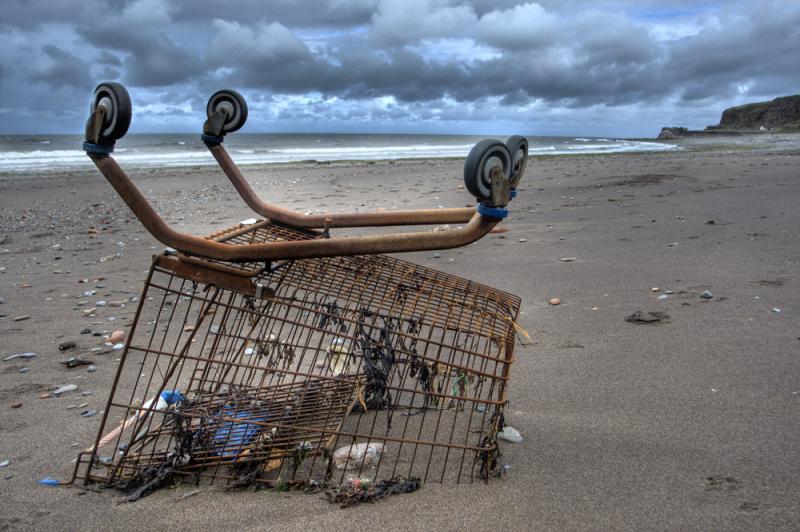Avoiding waste
The issue of waste production in Europe is a growing one. Statistics indicate that the European community generates around 2,000 million tonnes of waste each year, of which over 40 million tonnes is classified as hazardous. Over the last six years, the amount of waste generated grew by 10 % a year.
En savoir plus
Europe is not only generating vast amounts of waste however, it is at the same time wasting rich and valuable resources – material and non-material – which encompass food, people, knowledge & skills, housing, public spaces, everyday items/commodities, and more. This is at a time when unemployment levels are unsustainably high, when people are going hungry or have been forced to live on the streets.
The issue of waste therefore, is multi-dimensional and needs to be approached as thus: while it is imperative that people “reduce, re-use & recycle” waste, it is also important to consider new, alternative ways in which (unused or less used) resources could be better utilised, thus avoiding them being waste.
- Below are some examples of the types of actions (in orange) and policies (in green) that aim to avoid waste.
- These projects provide an insight into how waste production can be reduced as well as the ways in which the many resources available can be used in order to avoid waste.
 Picture by Alan Cleaver
Picture by Alan Cleaver
Co-operatives/shared spaces
A co-operative ("co-op") is an autonomous association of persons who voluntarily co-operate for their mutual, social, economic, and cultural benefit. Co-operatives may include non-profit community initiatives or businesses owned and managed by: the people who use its services (a consumer cooperative); by the people who work there (co-working spaces) or; by the people who live there (a housing co-operative).
En savoir plus
Co-operatives are typically based on the co-operative values of “self-help, self-responsibility, democracy and equality, equity and solidarity” and the seven co-operative principles:
- 1. Voluntary and open membership
- 2. Democratic member control
- 3. Economic participation by members
- 4. Autonomy and independence
- 5. Education, training and information
- 6. Co-operation among co-operatives
- 7. Concern for community
Click Here For Examples
Auteur : alessandra sciurba -
Publié le : 2013-07-22 11:03 -

|
The Project Rebeldia, a social center which was for two years without a space to carry out its activities, together with the Municipality of the Commons (consisting of groups and citizens' associations that have always worked with the Project Rebeldia) occupied a former paint factory (Ex Colorificio), located in an industrial area of a multinational of about 14,000 metres, and which had been abandoned for 5 years. The main purpose of the occupation was to return it to the associations and citizen groups as a shared and common good; a place for the provision of many different activities and services to the city.
|
Auteur : Lorna Muddiman -
Publié le : 2013-05-22 15:14 -

|
A housing co-operative refers to a group of people and the means they use to collectively control and manage their housing. It can buy and own property and enter into contracts. In brief, housing co-ops are essentially housing associations governed by the tenants/ members and give grassroots control over housing.
|
Auteur : Lorna Muddiman -
Publié le : 2013-05-22 14:15 -

|
A food co-operative or food co-op is a food distribution outlet organised as a co-operative. Food co-operatives are usually consumers' co-operatives where the decisions regarding the production and distribution of its food is chosen by its members.
|
Auteur : Lorna Muddiman -
Publié le : 2013-05-22 13:26 -

|
Co-working spaces possess a huge potential to support environmental sustainability due to their inherently sharing-oriented constitution. At its foundations, co-working supports the sharing of space, supplies and other resources, thereby cutting down on basic wastefulness.
|
Aucun article.
Use of public spaces
Click Here For Examples
Auteur : Alessandra Sciurba -
Publié le : 2013-07-31 14:50 -

|
Based on principles of solidarity and sharing: organisation and management of an old, important flea market that is run by a cultural association composed of Italian, migrant and Roma workers (about 300).
|
Auteur : alessandra sciurba -
Publié le : 2013-07-22 11:03 -

|
The Project Rebeldia, a social center which was for two years without a space to carry out its activities, together with the Municipality of the Commons (consisting of groups and citizens' associations that have always worked with the Project Rebeldia) occupied a former paint factory (Ex Colorificio), located in an industrial area of a multinational of about 14,000 metres, and which had been abandoned for 5 years. The main purpose of the occupation was to return it to the associations and citizen groups as a shared and common good; a place for the provision of many different activities and services to the city.
|
Auteur : alessandra sciurba -
Publié le : 2013-07-16 13:44 -

|
The non-profit Association Favara Urban Network is the laboratory for development of the City of Favara (AG). F.U.N. has the task of supporting, from a scientific and cultural point of view, the transformation processes of Favara and the metropolitan area.
|
Auteur : Lorna Muddiman -
Publié le : 2013-05-23 09:41 -

|
As people in Europe become more conscious about issues relating to waste, the environment, job security or financial insecurity, the DIY ("do it yourself") or GIY ("grow it yourself") movements have come to offer an alternative to modern consumer culture's emphasis on having to rely on others (industrial bodies, for instance) to satisfy needs.
|
Auteur : Lorna Muddiman -
Publié le : 2013-05-22 16:07 -

|
Since the economic crisis in Europe first began, the numbers of empty/abandoned buildings have multiplied. It is not uncommon to see vacant shops and other properties displaying "to let" signs in many towns and cities across the continent; processes of dereliction and ghettoisation are occuring as a result. This in turn affects the morale and well-being of local populations, possibly leading to anti-social behaviour, vandalism, etc. This particular section considers some solutions or "remedies" to alleviate the present situation.
|
Aucun article.
Systems of exchange
Click Here For Examples
Auteur : alessandra sciurba -
Publié le : 2013-07-22 11:03 -

|
The Project Rebeldia, a social center which was for two years without a space to carry out its activities, together with the Municipality of the Commons (consisting of groups and citizens' associations that have always worked with the Project Rebeldia) occupied a former paint factory (Ex Colorificio), located in an industrial area of a multinational of about 14,000 metres, and which had been abandoned for 5 years. The main purpose of the occupation was to return it to the associations and citizen groups as a shared and common good; a place for the provision of many different activities and services to the city.
|
Auteur : Lorna Muddiman/ Louise Hain -
Publié le : 2013-05-23 15:38 -

|
When markets are shaken, as happened in Cyprus for example, traditional money can become scarce, leading people to search for other ways to pay bills or carry out everyday activities. Time banks, LETS or electronic currencies are all examples of the alternative ways in which people can live their daily lives more easily and more economically.
|
Auteur : Lorna Muddiman -
Publié le : 2013-05-23 15:36 -

|
Freeshops, Giveaway Shops, Umsonstladen, Weggeef Winkel etc. are stores where all goods are free. They propose new ways of accessing goods that are based on the sharing of resources and avoiding waste.
|
Auteur : Lorna Muddiman/ Louise Hain -
Publié le : 2013-05-23 14:39 -

|
Online sharing communities are emerging all over the world to create links between people. The different platforms and groups offer alternative forms of consumption, where people are renting, lending and even sharing goods instead of buying them. It is not only material products that are being exchanged; people are also offering their knowledge, skills and time.
|
Aucun article.
Recovery of goods
Click Here For Examples
Auteur : Joël Obrecht -
Publié le : 2013-11-25 10:13 -

|
The Remix Project, dedicated to social and sustainable design, started three years ago in Lisbon. Every year the project has managed to win support of the municipal Vip- Zip program, aimed at neighborhoods priority intervention. Last year to increase the sustainability, the ReMix has introduced a service that relies on the provision of services to employees recruited from among the inhabitants of the district. When ReMix started, the team received more than 300 applicants, of which they have to choose just five. One of the selected is Antonio Paolo. Since then he became constant part of the team. The coordinator of the ReMix project is Angelo Campota, who recruited the team, among hundreds of nominations.
|
Auteur : alessandra sciurba -
Publié le : 2013-07-22 11:03 -

|
The Project Rebeldia, a social center which was for two years without a space to carry out its activities, together with the Municipality of the Commons (consisting of groups and citizens' associations that have always worked with the Project Rebeldia) occupied a former paint factory (Ex Colorificio), located in an industrial area of a multinational of about 14,000 metres, and which had been abandoned for 5 years. The main purpose of the occupation was to return it to the associations and citizen groups as a shared and common good; a place for the provision of many different activities and services to the city.
|
Auteur : alessandra sciurba -
Publié le : 2013-07-16 13:44 -

|
The non-profit Association Favara Urban Network is the laboratory for development of the City of Favara (AG). F.U.N. has the task of supporting, from a scientific and cultural point of view, the transformation processes of Favara and the metropolitan area.
|
Auteur : Mélissa/Anne-Iris -
Publié le : 2013-06-14 08:30 -

|
Lutherie Urbaine is dedicated to musical creation and instruments made from recycled materials. The social, ecological and multi-cultural aspects are part of each project, from its roots to its creation.
|
Auteur : Lorna Muddiman -
Publié le : 2013-05-23 15:57 -

|
Food retailers and consumers throw out millions of tons of edible food every year, for numerous reasons. At the same time as this mass waste, food poverty is spreading across the European continent and affecting more and more people daily. This therefore makes initiatives that focus on the redistribution of food critical to the well-being of society.
|
Auteur : Lorna Muddiman/Louise Hain -
Publié le : 2013-05-23 15:44 -

|
Freegans practice environmentalism that actively promotes "reclaiming, recovering, repairing and recycling."
|
Aucun article.
All Examples of Actions and Policies
Auteur : Joël Obrecht -
Publié le : 2013-11-25 10:13 -

|
The Remix Project, dedicated to social and sustainable design, started three years ago in Lisbon. Every year the project has managed to win support of the municipal Vip- Zip program, aimed at neighborhoods priority intervention. Last year to increase the sustainability, the ReMix has introduced a service that relies on the provision of services to employees recruited from among the inhabitants of the district. When ReMix started, the team received more than 300 applicants, of which they have to choose just five. One of the selected is Antonio Paolo. Since then he became constant part of the team. The coordinator of the ReMix project is Angelo Campota, who recruited the team, among hundreds of nominations.
|
Auteur : alessandra sciurba -
Publié le : 2013-08-30 08:47 -

|
Activities of Design / Recycling, with workshops and training courses aimed to act against waste and to develop income in the sector
|
Auteur : Claudia Coimbra -
Publié le : 2013-08-26 14:11 -

|
Projecto Fruta Feia ("Ugly Fruit") aims to minimise the social and environmental impact of food waste. The idea is to channel all rejected fruit and vegetable products to consumers that do not judge the quality of the product solely on appearances.
|
Auteur : Maria Jeliazkova -
Publié le : 2013-08-13 09:37 -

|
Improving the livelihood and social status of vulnerable people by establishing a social enterprise: the project aims to establish and develop a municipally-supported social enterprise in order to provide secured employment of disadvantaged people in Dimitrovgrad, thus improving their quality of life.
|
Auteur : Anne-Iris Romens -
Publié le : 2013-08-05 08:58 -

|
The Caxias Social Association aims to help families in need, solving social problems in households experiencing difficulties and/or with limited sustainability.
|
Auteur : Anne-Iris Romens -
Publié le : 2013-08-05 08:19 -

|
A non-profit and volunteer membership organisation, dedicated to prevent all types of wasting, with the fight against food waste as its most important and pressing goal.
|
Auteur : David Rinaldi -
Publié le : 2013-08-02 13:01 -

|
To avoid wasting goods and products by spreading the practice of bartering and promoting the growth of a network of barterers, craft workers and artists who focus their activity on the re-use of materials, and of local producers who place a premium on high-quality goods with due regard for the environment.
|
Auteur : Mariani Papanikolau -
Publié le : 2013-08-02 12:45 -

|
A Trade Union that is fighting for the independent operation and self-management of their abandoned factory.
|
Auteur : Mariani -
Publié le : 2013-08-02 12:12 -

|
A non-profit organisation fighting against the waste of leftover food by aiding the recovery and redistribution of food surplus to those in need throughout Greece.
|
Auteur : Louise Hain -
Publié le : 2013-07-29 19:16 -

|
A policy to boost the local economy by maximising social value the Birmingham Council require in its procurement strategy.
|
Auteur : Lorna Muddiman -
Publié le : 2013-06-28 12:19 -

|
In the UK, the Empty Properties Tax means that if a landlord leaves a property empty for more than three months they are required to pay business tax after that period.
|
Auteur : Lorna Muddiman -
Publié le : 2013-06-20 15:58 -

|
Container-deposit legislation (CDL) is any law that requires collection of a monetary deposit on soft-drink, juice, milk, water, alcoholic-beverage, and/or other containers at the point of sale.
|
Challenges
Aucun article.
Contribute an action to the theme
Contribute a Challenge to this theme
Click here to contribute a challenge
Picture by Alan Cleaver

